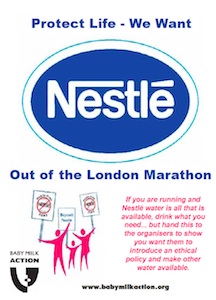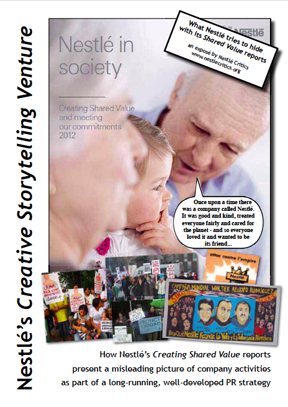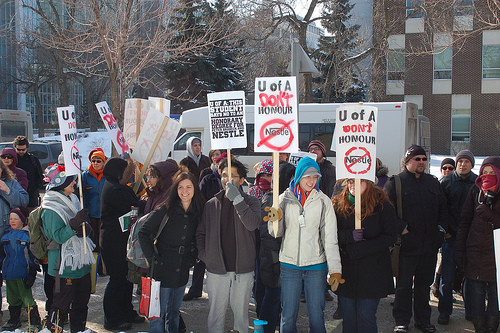[youtube=http://www.youtube.com/watch?feature=player_embedded&v=7iGj4GpAbTM]
Nestlé Chairman, Peter Brabeck-Letmathé, has rejected this view in an interview. Under his principles, water is a foodstuff to be sold at a price. He claims that by placing a value on water it will be treated with more respect. People who are poor and have difficulty accessing water should be given help, he says. Of course, Nestlé aims to make a buck from this process and is actively and agressively appropriating community water supplies, often in the face of opposition and legal challenges from those communities. It tries to divert criticism of these tactics with its CSV strategy, that is its Creative Storystelling Venture, or what it prefers to call Creating Shared Value.
From monitoring Nestlé’s baby milk marketing activities and working with partners around the world to force it and other companies to abide by minimum marketing standards, I have seen Nestlé’s strategies employed in their full range from slick PR to dirty tricks. I’ve also followed the water issue with interest, particularly the ten year campaign that ultimately stopped Mr Brabeck’s destructive water pumping operation in the Brazilian spa town of São Lourenço – where I bought my cap.
If water is seen as a human right and a public good then it has to be managed in the public interest. In too many cases community water resources are appropriated by Nestlé and other companies. There is information on Nestlé’s involvement in water on the Nestlé Critics website: http://www.nestlecritics.org/
Water as a human right and public good
Baby Milk Action has backed the campaign for water to be a human right and a public good for many years and raised concerns about Nestlé’s water operations at the company’s shareholder meeting.
For example, we organised a joint event with Christian Aid, War on Want and the World Development Movement in 2006. Our special guest at that event was Franklin Fredrick, a campaigner from Brazil trying to stop Nestlé’s destructive Pure Life water bottling operation in the historic water park in São Lourenço. Organisations signed up to a declaration commiting to work on this issue and to calling on governments “to guarantee, through appropriate laws, the human right to water and the declaration on water as a public good, and to work for the drawing up of an international convention on water to be adopted by the UN”. This campaign continues on many fronts.
 Pure Life is one of Nestlé’s global brands of water. It promotes it as the official sponsor of the London Marathon (click here for our 2011 press release and leaflet).
Pure Life is one of Nestlé’s global brands of water. It promotes it as the official sponsor of the London Marathon (click here for our 2011 press release and leaflet).
We have asked the London Marathon to consider another sponsor and even reported it to the Charity Commission for refusing to be transparent over its policy on sponsors as required by the Charity Commission. The Charity Commission said it could not investigate as the sposorship is organised by London Marathon Ltd, which is separate to the company and not covered by charity law, even though it is 100% owned by the London Marathon Charitable Trust and passes all profits to the Trust.
While the Chief Executive of the London Marathon has indicated he is willing to discuss this issue, he has also said there is no point as the contract with Nestlé is not up for renewal for some time. A boycott supporter sets up an alternative water point along the course, but is not feasible for us to provide alternatives around the route. It is for marathon runners to campaign for alternative supplies if they do not want to be forced to drink Nestlé’s Pure Life water.
Nestlé’s illegal Pure Life water operation in Brazil
Nestlé launched Pure Life water in Brazil after sinking wells in 1996 in the water park in São Lourenço, which it acquired in its takeover of Perrier in 1992. Nestlé’s business model is to become the biggest or second biggest corporation in the world in any sector it enters and bottled water became one of its targets for global domination. São Lourenço has grown up and makes its living from the great variety of mineral springs that come to the surface in the water park, a virtually unique geological feature. There are mineral baths and a series of chapels over the springs to take the healing waters.
 Nestlé’s bottling factory is in the area of maximum environmental vulnerability, as shown on the map, left.
Nestlé’s bottling factory is in the area of maximum environmental vulnerability, as shown on the map, left.
Most of the spring water is not very pleasant to drink due to the high mineral content. One spring, the Primavera Spring, does produce mineral water and it was that which Perrier was bottling as São Lourenço water. When Nestlé took control, it sank two 162 metre deep wells and began pumping water at such a high rate (half a million litres per day) it had to build a wall around the plant extending 7 metres into the ground to prevent surface water being sucked into the well. Such was the suction that trees within this wall dried up and died.
Nestlé demineralised the water – in breach of federal laws that value mineral water as a natural resource – added its own salt ingredients and began dispersing it around Brazil backed by a marketing campaign to create demand.
 Meanwhile the other springs began to dry up or change their mineral profiles at the massive draw off of water and some of the chapel buildings suffered subsidence and cracking (as Franklin points out, left).
Meanwhile the other springs began to dry up or change their mineral profiles at the massive draw off of water and some of the chapel buildings suffered subsidence and cracking (as Franklin points out, left).
It took ten years to stop Nestlé’s pumping, finally under the threat of daily fines until it did so.
I visited São Lourenço while the destruction was still in full swing. The townspeople were so angry at the fall off in trade to their hotels and restuarants they had petitioned the local prosecutor to take action. He managed to stop the pumping for two days following an investigation, but Nestlé appealed to a higher court and the years passed by. BBC Radio 4 recorded an edition of Face the Facts on the case in 2005. The listen again archive seems to have gone now, but the transcript is available at:
http://www.bbc.co.uk/radio4/facethefacts/transcript_20050722.shtml
Nestlé’s spies infiltrate campaign group
Franklin joined us at the meeting in 2006 to launch the petition on water as a human right and public good. Nestlé wrote to our partners in the event attacking Franklin Fredrick with false claims. For example, Nestlé dismissed his accusations against the company stated: “a third party audit by Bureau Veritas confirms that we have acted in accordance with Brazilian legislation…” Yet when I managed to raise this in a question to Nestlé’s Latin American manager and now Chief Executive, Paul Bulcke, from the floor of a meeting held by the Prince of Wales Business Leaders’ Forum, Bureau Veritas, also present in the audience, admitted, “our work did not constitute a legal audit as such, nor did it include a review of the on-going civil action”. The civil action had actually been concluded at that point and Nestlé ordered to stop pumping under the threat of daily fines.
As well as its personal attack on Franklin, Nestlé also placed spies in ATTAC Switzerland, which included the water issues in its book on the Nestlé Empire and invited Franklin to the launch. Franklin gave an interview to Swiss WRS radio when the issue came to court in January 2012 – for details, click here. The court ordered Nestlé and Securitas, its security company, to pay damages and court costs to the victims and, case proven, the companies are not appealing – click here.
Nestlé’s Creative Storytelling Venture – the true meaning of its CSV strategy
Nestlé does not like critics and hired PR guru Raphael Pagan in the 1970s to develop a strategy to respond to disasterous publicity over its baby milk marketing, which was coming to public attention at that time. The strategy developed continues to be followed today.
 Part of it involves portraying the company as a force for good and Nestlé unveiled its latest Creating Shared Value report at the shareholder meeting.
Part of it involves portraying the company as a force for good and Nestlé unveiled its latest Creating Shared Value report at the shareholder meeting.
We have produced a preliminary analysis we call Nestlé’s Creative Storytelling Venture, the true meaning of CSV. It shows that what Nestlé says it does and what it actually does are two very different things.
Nestlé’s report is full of references to water and Mr Brabeck’s leadership role in this area. He states in his introduction to the report:
“We believe that we can create value for our shareholders and society by doing business in ways that specifically help address global and local issues in the areas of nutrition, water and rural development. This is what we mean when we speak about Creating Shared Value (CSV). We proactively identify opportunities to link our core business activities to action on related social issues.”
Nestlé boasts of cutting its own water consumption, which is to be welcomed, if true. Unfortunately it is difficult to know what can be believed as on the baby milk issue – of which I have direct knowledge – Nestlé’s report is thoroughly dishonest (details in our analysis).
Nestlé highlights that its report is audited by Bureau Veritas. But given its negligent job in performing Nestlé’s so-called legal audit in São Lourenço, that is not saying much.
Nestlé seizes the water agenda
Mr Brabeck is presents himself as a guru on water. For example, he has become a vociferous campaigner against biofuels, claiming they use too much water and land that should be used for farming, while being a poor response to climate change. That is an argument that should be made, but it is laughable coming from the leader of a company that by its very nature is opposed to local production and consumption of food, instead shipping highly processed foods around the planet.
Mr Brabeck also leads the World Economic Forum (WEF) Water Resources Group, is a founder signatory of the UN Global Compact CEO Water Mandate and sponsors World Water Week in Stockholm, as well as other initiatives to promote bottled water, such as the London Marathon.
Franklin Fredrick continues to campaign to protect water resources and his article on the Water Resources Group was published recently. See:
http://europeanwater.org/european-water-resources/reports-publications/204-water-alternatives

Original source- http://info.babymilkaction.org/
Related articles
- Nestle CEO seeks to control the world’s water supply: BOYCOTT NESTLE NOW!! (ascendingstarseed.wordpress.com)
May 10, 2013 at 2:23 pm
Nestle are to human dignity as Hitler was to peace.